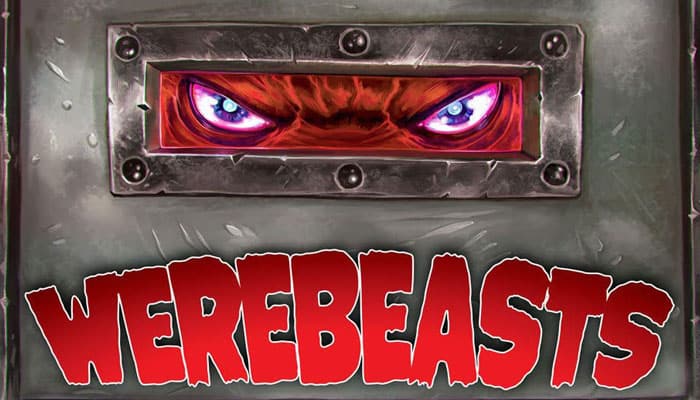

Components
- 12 Goal Cards
- 80 Werechow Can Tokens
- 44 Auction Cards
- Instructions
Object of the Game
Collect Werebeasts that match your goals, but don't let anyone figure out which Werebeasts you're collecting.
Setup
Take the Werechow Goal card and randomly choose a number of Goal cards equal to one more than the number of players (for instance, with five players, use six goal cards and one Werechow Goal card).
Lay out the goal cards so everyone can see them.

Then take the Auction cards that match the chosen Goal cards (each Goal card has four corresponding Auction cards, except for the Werechow goal card). Return the unused Goal and Auction cards to the box.

Shuffle the Auction cards and place them face down in a stack in the middle of the table.
Shuffle the Goal cards and place one between each player, face down. Return any leftover Goal cards to the box (keeping them face down so no one sees what they are).

You may view the Goal cards on either side of you at any time.
Give each player eight Werechow tokens, and return unused tokens to the box (they will not be used in this game).

Choose a dealer randomly. That player deals one Auction card faceup in front of each player, including himself. He then gives the deck to the player to his left, who becomes the Active Player
Special 3-player & 4-player Setup
If playing with 3 or 4 players, each player receives two face-down goal cards, which he puts directly in front of himself, which he can view at any time during the game. These goal cards are not shared with other players.

Game Play
All turns proceed clockwise. On your turn, you (the Active Player) may Accuse and/or Sell, in that order.
Accuse (Optional)
You may accuse any other player of having a particular Goal card: either a specific Werebeast or Werechows. No other players may accuse on your turn. You may not accuse another player of having either of your goals or any face-up goals.

If your accusation is correct, the accused player must reveal the Goal card you guessed, leaving it face-up, and is eliminated from the game.
You may then take either the eliminated player's Auction or Werechow tokens for yourself. The Auction cards or Werechow can tokens which are not chosen remain in front of the eliminated player.

After that, you may accuse another player or begin selling.
If your accusation is incorrect, the accused player denies it, reveals no Goal cards, and you are eliminated. The accused player takes either your Auction cards or your Can of Werechow tokens, leaving the other option in front of you.
If you are eliminated, the player to your left becomes the new Active Player and begins a new turn.
Selling
Reveal the top Auction card from the deck. In any order, the other players may bid on the card with their current Auction cards, Werechow tokens, or any combination of them.

You may accept any bid offered, regardless of value. If no one bids on the Auction card after 10 seconds, you keep it for yourself.
When you are done, cards and/ or tokens change hands and are placed in front of their respective owners. The player to your left becomes the new Active Player and begins a new turn.
End of the Game
The game ends as soon as the last Auction card is sold, or only two players remain, whichever comes first.
All players then reveal their Goal cards.
Scoring
Each player who wasn't eliminated scores 1 point for each Auction card he holds that matches one of his two Goal cards. A matching Auction card that shows two of the same Werebeast scores 1 more point.
A player with the Werechow Goal card scores 1 point for each complete set of four Werechow tokens he has.
The player with the most points wins. In case of a tie for most points, the tied player with the most Werechow tokens wins. If there is still a tie, the tied player with the most total Auction cards (count double Werebeast cards as two) wins.
If there is still a tie, the tied players lose for wasting everyone's time counting things, and all the other players win.
Continue Reading
